Table of Contents
Understanding AI in Marketing: Unlocking the Future of Digital Strategy
Keeping up with consumer behavior, trends, and campaign performance can feel like an impossible juggling act. Every day, marketers are overwhelmed with data yet struggle to turn it into meaningful insights. That’s where artificial intelligence (AI) comes in, revolutionizing the way businesses connect with their audiences. From automating routine tasks to predicting customer needs with laser precision, AI tools are reshaping the marketing landscape. But with so many tools available, how do you know which ones will drive real results?
We will explore the benefits, top tools, and future trends that will help your digital strategies thrive. Whether you’re just beginning to explore AI or looking to refine your existing toolkit, we’ll give you everything you need to transform your marketing approach and boost engagement, efficiency, and ROI. Ready to unlock the power of AI? Let’s get started.

Understanding AI in Marketing
Ever feel like you’re drowning in marketing tasks? That’s where AI comes in, shaking things up in the digital marketing world. But what’s the real deal with these AI tools for marketing everyone’s talking about?
Artificial Intelligence has become a cornerstone in modern marketing strategies. By automating processes and offering advanced data analysis, AI helps agencies optimize campaigns, personalize customer interactions, and stay ahead of trends. With AI, marketing is more targeted, efficient, and scalable than ever before.
“It is estimated that AI will drive 95% of all customer interactions by 2025.”
– Nogood 2024
What Are AI Tools for Marketing?
AI tools for marketing are software solutions that leverage machine learning, natural language processing, and predictive analytics to enhance marketing activities. These tools streamline operations by automating repetitive tasks, analyzing consumer behavior, and improving customer engagement through personalized experiences. AI tools are used across various marketing domains, such as content creation, customer service, and advertising optimization.
Key benefits of AI tools in Marketing:
- Automation: Tools like HubSpot and Marketo automate email campaigns, social media scheduling, and lead nurturing, freeing up valuable time for marketers.
- Data-driven insights: Platforms like Google Analytics 4 and Adext AI analyze vast amounts of customer data to provide insights that drive decision-making.
- Personalization: AI tools such as Drift and Persado use NLP to tailor content and communication to individual preferences, enhancing user experiences.
By using AI tools, digital agencies can optimize client campaigns, reduce manual effort, and increase return on investment (ROI).

The Evolution of AI Marketing Software
The evolution of AI in marketing has been rapid, with the shift from basic automation to sophisticated data analysis tools that can predict customer behavior and optimize in real time. Initially, AI marketing software focused on simple tasks like automating email marketing or social media posts. Today, it encompasses more complex functionalities, including predictive analytics and hyper-personalized marketing.
Milestones in AI marketing software:
- Automation: Early AI tools like Mailchimp automated email marketing, allowing for segmentation and scheduled delivery.
- Predictive Analytics: Modern tools like Cortex and Optimizely now offer real-time analytics, predicting trends and adjusting campaigns dynamically.
- Customer Experience Optimization: Tools such as Salesforce Einstein and Conversica analyze customer data to optimize touchpoints and improve engagement at every stage of the customer journey.
As AI marketing tools continue to evolve, they are increasingly integrated across platforms, providing end-to-end solutions that empower agencies to scale operations and achieve better client outcomes.

Benefits of Using AI Tools in Digital Marketing
AI tools for marketing have revolutionized digital strategies by improving efficiency, personalization, and decision-making. In this section, we explore the key benefits of integrating AI tools into digital marketing, highlighting their impact on automation, ROI, and customer engagement.
Enhancing Efficiency with AI Marketing Automation
AI tools help automate repetitive tasks in digital marketing, saving time and minimizing human error. Tasks like data entry, email scheduling, and social media management can be fully automated. For instance, tools like ChatGPT, integrated with platforms like Zapier, can generate personalized marketing messages and automatically respond to customer inquiries, allowing marketers to focus on strategic activities.
Additionally, Brevo simplifies email marketing with pre-built automation workflows for tasks like welcome emails and cart abandonment follow-ups. Its drag-and-drop editor and pre-designed templates make creating professional campaigns easy, improving both efficiency and consistency across channels.

Furthermore, AI-powered chatbots enable businesses to create custom bots without coding. These bots handle customer support, generate content, and send notifications, providing 24/7 engagement with minimal manual input.
AI tools have the power to automate repetitive tasks, saving marketers time and reducing human error. From automating social media scheduling to managing email campaigns, automation allows teams to focus on strategy and creativity.
But saving time is just the beginning; AI tools are also transforming how businesses measure success, especially when it comes to maximizing ROI.

Improving ROI with AI Marketing Platforms
AI tools significantly enhance ROI by optimizing marketing decisions and improving targeting. For example, Surfer SEO analyzes search engine results pages (SERPs) and competitor strategies to recommend the best keywords, helping marketers improve their content’s ranking potential. This leads to better organic reach and a more efficient use of marketing budgets.
Another tool, GrowthBar, uses GPT-3 to automate content generation and provides keyword suggestions, backlinks, and SEO improvements. This automation not only speeds up content creation but also ensures it aligns with best SEO practices, driving higher traffic and conversion rates.
For ad campaigns, Albert.ai leverages machine learning to optimize ad spend by analyzing audience data in real time, ensuring that ads reach the right people at the right time. This helps maximize both engagement and conversion rates.
By using AI-powered platforms, businesses can ensure that their marketing dollars are being spent wisely. Tools like Surfer SEO and Albert.ai help marketers optimize ad spend and improve targeting, ensuring that every dollar yields the highest return. Once you have the efficiency and ROI locked in, the next step is creating deeper connections with your audience, and that’s where AI-driven personalization can make all the difference.

Boosting Customer Engagement with AI Tools
AI tools improve customer engagement by delivering personalized experiences and real-time interactions. For instance, Brand24 offers social listening capabilities, allowing brands to monitor online conversations and track customer sentiment across millions of sources. This enables brands to engage meaningfully and manage their reputation more effectively.
Moreover, DeepBrain AI Studios enables marketers to convert text into video using customizable AI avatars, creating engaging, photo-realistic content without the need for actors or production teams. This makes video content creation faster and more affordable, enhancing customer interaction.
Finally, Brevo also supports multichannel marketing through email, SMS, and WhatsApp, ensuring brands can reach customers on their preferred platforms. With AI managing timing and content recommendations, businesses can improve open rates and customer responses, driving higher engagement.

AI tools are transforming the way businesses approach marketing by automating tasks, optimizing content, and enhancing customer engagement. Below, we break down some of the most powerful AI tools in digital marketing for 2024, categorized by their functions, the problems they solve, and why they’re popular among marketers.
AI tools don’t just make marketing more efficient; they also make it more personal. Platforms like Brevo and Brand24 allow businesses to monitor real-time customer sentiment and engage users with personalized experiences across email, social media, and beyond.
With engagement and personalization covered, let’s dive into the AI tools that are transforming digital marketing today.
Top AI Tools in the Market for Digital Marketing
AI tools are transforming digital marketing by automating tasks, optimizing content, and improving customer engagement. Below, we break down the top AI tools for digital marketing in 2024, categorizing them based on their functions and highlighting real-world applications, integration features, and scalability to help businesses choose the right tools.
1. ChatGPT
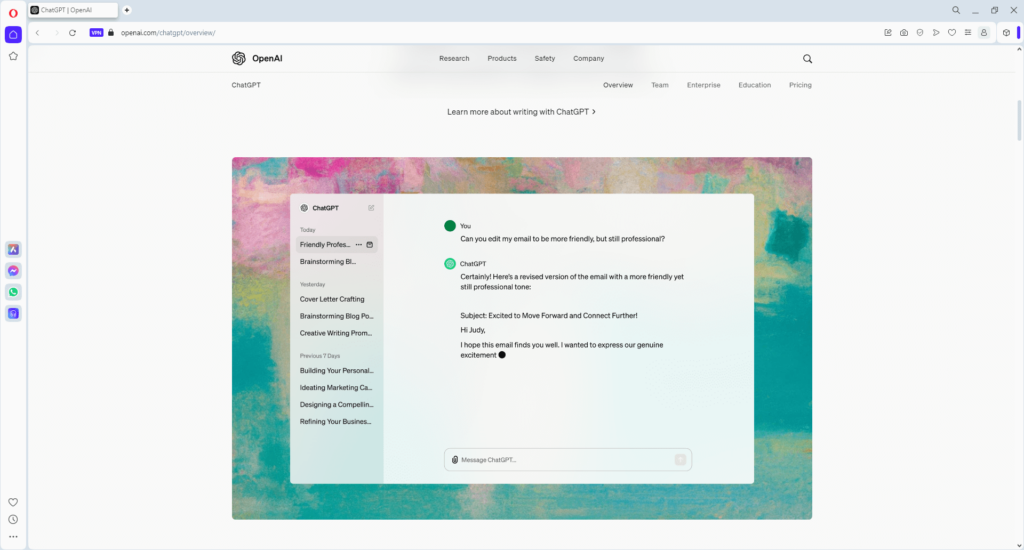
- Functionality: Content creation and customer engagement
- What Problems They Solve: ChatGPT automates tasks like email content generation, real-time customer interactions, and brainstorming. It helps marketers focus on strategic work rather than repetitive tasks.
- Why It’s Popular: Its versatility and ease of integration with platforms like Zapier make it a top choice for efficient communication.
- User Experience: Many businesses use ChatGPT to boost customer service without expanding their support teams, especially for handling FAQs.
- Scalability: From handling simple inquiries for small businesses to generating sophisticated long-form content for enterprises, ChatGPT grows with the company’s needs.
2. Brevo
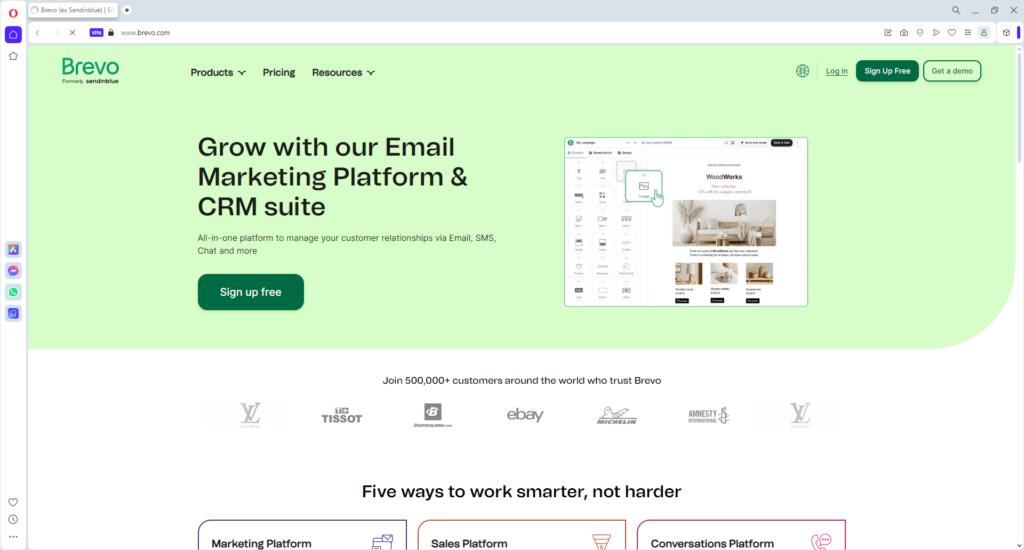
- Functionality: Multichannel marketing platform
- What Problems They Solve: Brevo helps businesses automate emails (e.g., welcome messages, cart abandonment) and integrates with SMS, WhatsApp, and social platforms, ensuring consistent messaging across channels.
- Why It’s Popular: Known for its ease of use and personalization features, Brevo is trusted by companies like eBay and Stripe for its ability to enhance engagement across various customer touchpoints.
- Scalability: With its multichannel capabilities, Brevo supports both small businesses and enterprises, scaling as their marketing needs grow.
3. Surfer SEO

- Functionality: SEO optimization
- What Problems They Solve: Surfer SEO analyzes search engine data and provides recommendations for keyword usage, SERP analysis, and content optimization, improving website rankings.
- Why It’s Popular: Surfer SEO’s data-driven insights help marketers align content with search engine algorithms, increasing their visibility.
- Case Study: Many agencies use Surfer SEO to ensure their clients’ content ranks higher, reducing manual keyword research and significantly improving organic traffic.
- Scalability: Surfer SEO is a great fit for agencies managing multiple client accounts, providing scalable insights from small campaigns to large, complex SEO operations.
4. GrowthBar
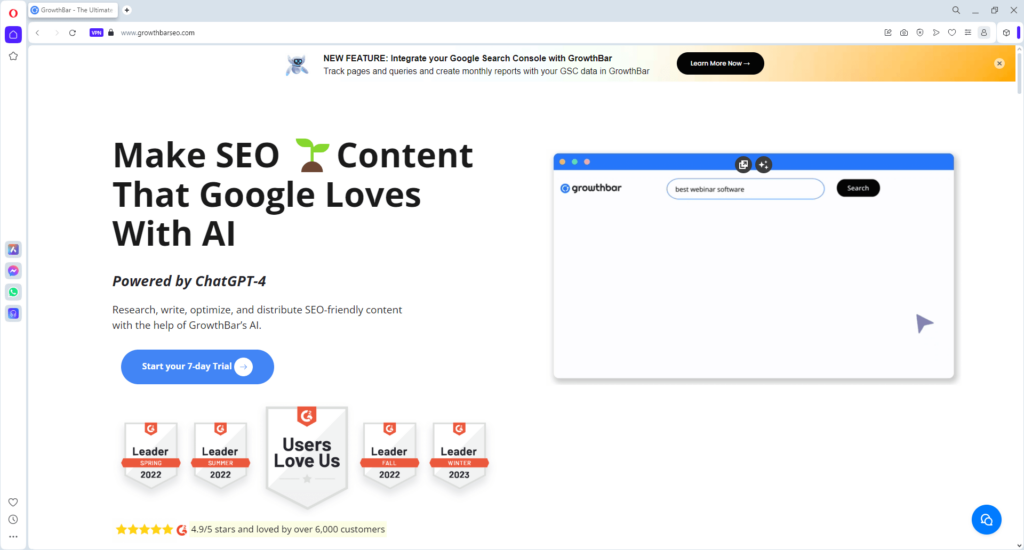
- Functionality: SEO and content creation
- What Problems They Solve: GrowthBar automates blog outlines, keyword suggestions, and backlink strategies, streamlining content creation.
- Why It’s Popular: Its integration with Chrome allows marketers to work directly within their browsing workflow, making it convenient for content creation.
- Real-World Application: Marketers use GrowthBar to generate optimized blog content in minutes, ideal for businesses that prioritize rapid, data-backed content production.
- Scalability: GrowthBar grows with the business, providing more advanced SEO strategies as campaigns expand and more content is needed to drive traffic.
5. Podcastle
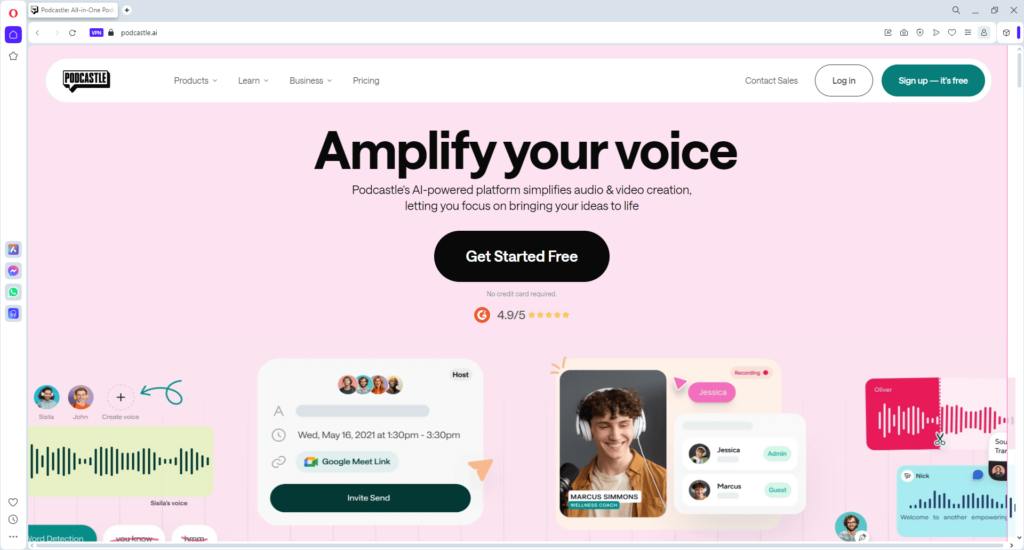
- Functionality: Multimedia content creation
- What Problems They Solve: Podcastle simplifies audio and video production with AI-driven tools that handle noise removal, volume adjustments, and content editing.
- Why It’s Popular: It’s user-friendly, making professional-quality podcast and social media video production accessible even to small teams without technical expertise.
- Integration: Creators can easily export their multimedia content to major platforms, streamlining their workflow from creation to distribution.
- Scalability: Podcastle is used by both independent content creators and larger media teams, with features that adapt to increasing production demands as businesses grow.
6. Magic Studio
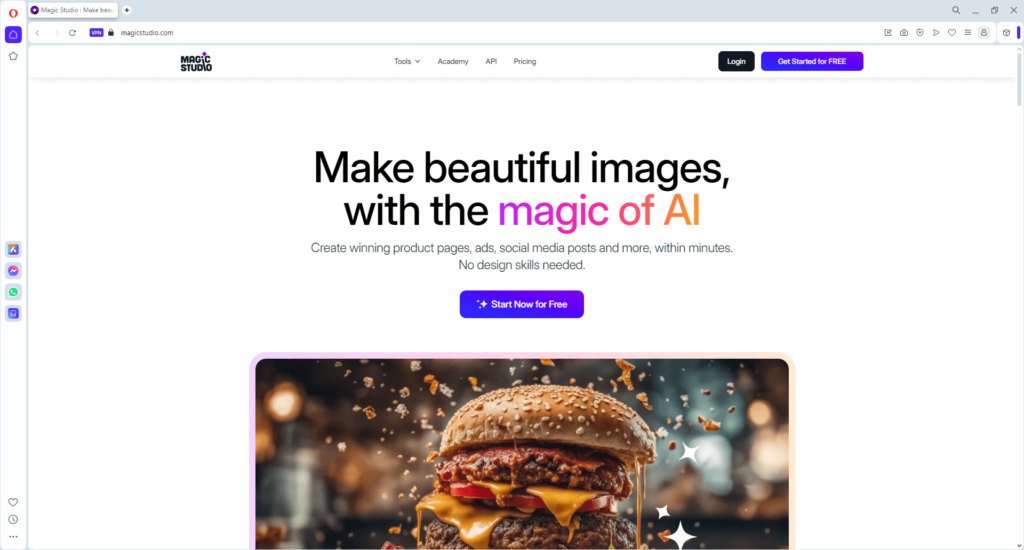
- Functionality: Visual content creation
- What Problems They Solve: Magic Studio helps businesses create high-quality images through AI-powered background removal and object erasing, ideal for e-commerce product visuals.
- Why It’s Popular: Its easy-to-use interface allows non-designers to create polished visuals, making it a go-to tool for businesses needing fast, professional images.
- Scalability: Small businesses use Magic Studio’s free version, while larger companies often upgrade for advanced features and higher production volume.
- Scalability: Small businesses start with the free version, but as their needs grow, Magic Studio’s advanced features support scaling up visual content production.
7. DeepBrain AI Studios
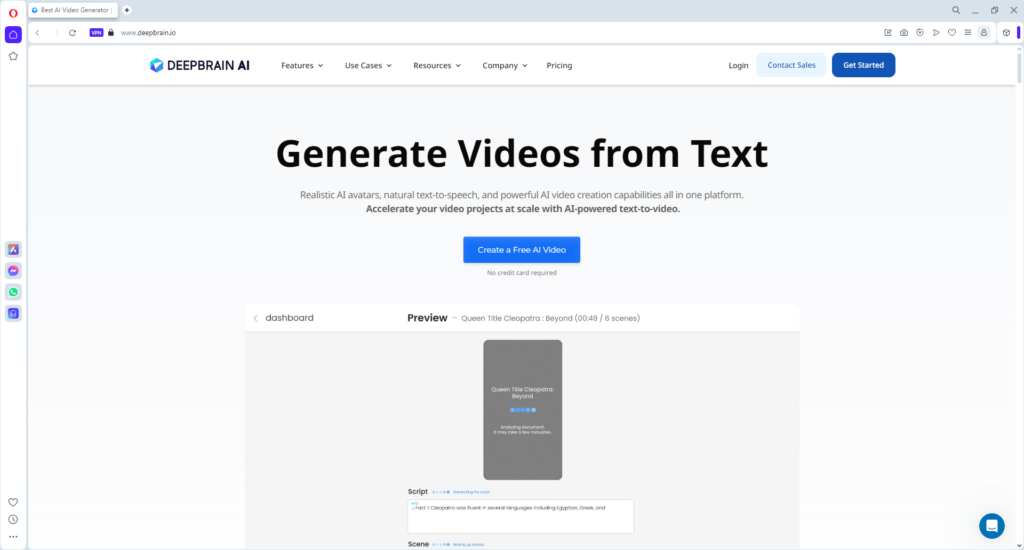
- Functionality: Video content creation
- What Problems They Solve: DeepBrain AI Studios converts text into video using customizable avatars, reducing the need for full-scale video production teams.
- Why It’s Popular: Businesses leverage this tool to scale video marketing efforts affordably, creating engaging content for platforms like YouTube and social media.
- Real-World Use: Brands use it to produce training videos, tutorials, and marketing content, reducing production costs and time.
- Scalability: DeepBrain’s scalability makes it ideal for companies looking to ramp up video production as their content needs grow.
8. Brand24

- Functionality: Social listening and media monitoring
- What Problems They Solve: Brand24 tracks online mentions and performs sentiment analysis, helping companies manage their brand reputation by providing real-time insights.
- Why It’s Popular: Its ability to identify brand mentions and monitor feedback in real-time allows businesses to quickly address issues, enhancing brand perception.
- Real-World Impact: Used by marketing teams to transform negative feedback into positive customer experiences.
- Scalability: Brand24 serves businesses of all sizes, from small companies managing local reputations to large corporations monitoring global conversations.
9. Albert.ai
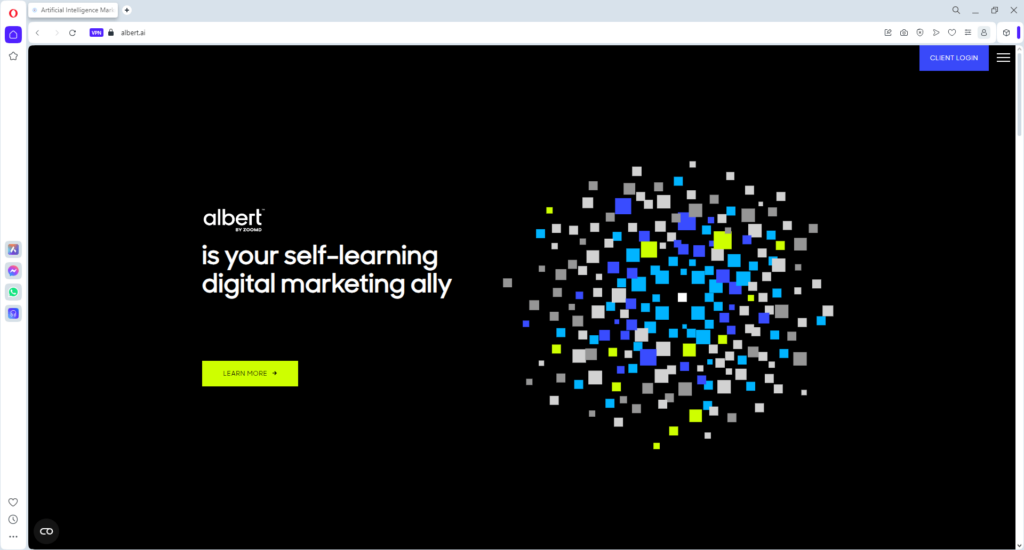
- Functionality: AI-powered advertising platform
- What Problems They Solve: Albert.ai uses machine learning to optimize ad spend by ensuring ads target the right audience at the right time, boosting campaign ROI.
- Why It’s Popular: Its automation of ad buying and real-time adjustments improve reach while lowering costs, making it a critical tool for performance-driven campaigns.
- Scalability: Albert.ai is popular among enterprises needing to optimize large-scale ad campaigns.
- Scalability: Albert.ai is highly scalable, designed to support both small ad campaigns and complex, large-scale marketing initiatives.
10. Skai
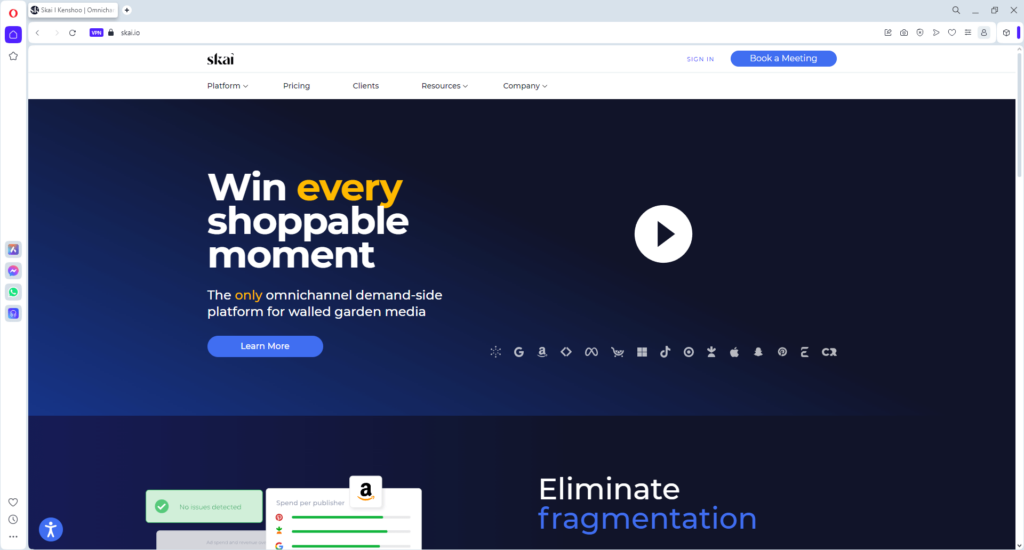
- Functionality: Omnichannel advertising
- What Problems They Solve: Skai provides insights for omnichannel campaigns, optimizing ad performance across multiple platforms with creative intelligence and data analysis.
- Why It’s Popular: It helps marketers manage complex campaigns, providing creative insights that improve engagement and ROI.
- Use Case: Skai is widely used by agencies managing large client portfolios across various advertising channels.
- Scalability: Skai’s omnichannel capabilities are suitable for both small agencies and large businesses, providing insights and optimization strategies for growing campaigns.

Best Free AI Tools for Digital Marketing
- ChatGPT: The free version of ChatGPT (GPT-3.5) is ideal for content generation, customer support, and ideation, helping marketers save time on everyday tasks.
- Podcastle: The free version includes basic audio and video recording, making it perfect for creators experimenting with podcasts and social media videos on a budget.
- Magic Studio: Offers free features like background removal for basic photo editing, perfect for e-commerce businesses that need professional visuals without the cost.
These AI tools help businesses automate processes, optimize content, and scale marketing efforts efficiently. With tools for every aspect of marketing, from SEO and content creation to video production and social listening, businesses can enhance their campaigns, improve customer engagement, and maximize ROI.

AI Marketing Apps for Business Marketing
AI-powered marketing apps simplify customer engagement by leveraging automation and personalization features:
| AI Tool | Free Features | Use Case | Source |
|---|---|---|---|
| Brevo | Integrates channels like SMS, WhatsApp, and Facebook Messenger for personalized, multichannel communication. Free plan offers basic automation for up to 2,000 contacts | Multichannel marketing and consistent messaging | Brevo |
| Zapier Chatbots | Free plan allows the creation of custom AI chatbots that integrate with other tech stacks to automate customer inquiries and support tasks | Automating customer interactions and enhancing support efficiency | Tech.co |
| Brand24 | Mobile app provides real-time alerts on brand mentions across social media and the web, helping manage brand reputation | Brand monitoring and reputation management on mobile | Brand24 |
We’ve now covered the latest and most effective AI tools for digital marketing in 2024. Whether it’s creating high-quality content, optimizing SEO, managing multichannel campaigns, or monitoring brand sentiment, these AI tools for marketing are transforming how businesses operate. With various pricing options, including free AI tools for digital marketing, businesses of all sizes can benefit from AI to enhance their marketing strategies, improve customer engagement, and maximize ROI.
But with so many tools available, how do you choose the right one? In the next section, we’ll explore key factors to consider when selecting the best AI tools for digital marketing, including budget, scalability, and the specific needs of your marketing team.

How to Choose the Best AI Marketing Tools
Selecting the right AI tools for marketing is essential for improving the efficiency and effectiveness of your digital strategies. With a wide range of AI marketing platforms available, identifying the tools that align with your specific business needs is critical. Below, we explore the key features to consider when comparing the best AI tools for digital marketing.
7 Key Features of the Best AI Marketing Software
When evaluating AI marketing tools, certain features ensure you get the maximum value from your investment. Here are some critical factors to consider when choosing an AI marketing platform:
1. User-Friendliness:
An effective AI tool for digital marketing should be easy to use. Platforms like Brevo feature drag-and-drop editors, enabling marketers to create personalized campaigns without technical expertise. This ease of use is crucial for teams needing quick AI implementation with minimal learning time.
2. Integration Capabilities:
Seamless integration with existing systems is vital. Tools such as ChatGPT and Zapier Chatbots offer robust integration options, connecting with popular apps like Slack, Google Sheets, and CRM platforms. This ensures smooth data flow, facilitating an all-in-one approach to AI marketing automation.
3. Automation and Personalization:
One of the key advantages of AI tools for digital marketing is automation. Platforms like GrowthBar and Surfer SEO automate content creation and provide SEO enhancements to boost search rankings. Additionally, tools like Brevo enable advanced personalization across email, SMS, and social media, enhancing engagement.
4. Real-Time Data Analysis:
Tools that offer real-time insights, such as Brand24, help optimize strategies in real-time by providing alerts on brand mentions. Having access to real-time analytics is essential for agile decision-making and maintaining responsive marketing strategies.
5. Scalability:
As your business grows, your AI marketing software must scale with it. Platforms like Albert.ai optimize large-scale ad campaigns, while Brevo manages thousands of multichannel communications, making them ideal for businesses poised for growth.
6. Customer Support:
Reliable support is essential for managing complex AI systems. Platforms like Zapier Chatbots offer user-friendly tutorials and extensive customer support to help with setup and ongoing usage.
7. Affordability and ROI:
Pricing is a key factor, especially for smaller businesses. Free tools like ChatGPT and Podcastle are great options for those just starting. For more advanced features, such as higher-resolution video editing or advanced chatbot functionality, upgrading to paid versions can provide a stronger return on investment.

Comparing Top AI Marketing Platforms
When evaluating AI marketing platforms, a systematic approach ensures you choose tools that align with your business needs and help optimize your marketing strategy.
🎯 Define Your Objectives:
Identify your primary goals for adopting AI tools for marketing. For content creation and SEO optimization, tools like GrowthBar or Surfer SEO are ideal due to their strong content generation capabilities. If customer engagement is your focus, ChatGPT’s conversational AI makes it a great choice.
🧪 Test Trial Versions:
Many AI tools for digital marketing offer free plans or trial versions, allowing businesses to assess features before committing to a paid plan. For example, Podcastle and Magic Studio provide free options with basic features, making them useful for testing before scaling up.
📝 Read Reviews and Case Studies:
User reviews and case studies offer valuable insights into a tool’s effectiveness. For instance, Brand24 is often praised for its social media monitoring capabilities and reputation management, making it a strong option for brands focusing on real-time feedback.

🔌 Consider Integration Needs:
Ensure the AI marketing software integrates seamlessly with your existing tech stack. Tools like Zapier Chatbots excel at integrating with other platforms, making them adaptable to various business environments.
⚙️ Assess Customization and Flexibility:
Depending on your marketing needs, the level of customization offered by an AI tool might be a deciding factor. Solutions like Brevo and Zapier Chatbots provide highly customizable workflows, making them suitable for businesses needing personalized automation.
📈 Evaluate Scalability for Future Growth:
If your business is rapidly growing, choose an AI marketing platform that can scale with your increasing data and campaign complexity. Albert.ai is noted for its ability to manage large-scale ad campaigns, making it ideal for businesses with significant growth trajectories.
By carefully considering these factors, businesses can ensure they choose the best AI tools for digital marketing that align with their needs, enhance marketing efficiency, and drive improved customer engagement and ROI. You can ensure that the tools you choose align perfectly with your goals, enhance operational efficiency, and drive customer engagement. But selecting the right platform is only the beginning.
To truly unlock the potential of AI, the way you implement these tools is just as critical. In the next section, we’ll dive into best practices for utilizing AI tools in digital marketing, where we’ll explore practical steps to seamlessly integrate AI into your workflows and maximize its value for your marketing campaigns.

7 Best Practices for Implementing AI Tools in Digital Marketing
Successfully incorporating AI tools for marketing requires a strategic approach that ensures the tools align with your business objectives and deliver measurable value. Below are best practices for integrating AI marketing tools into your workflow.
1. Set Clear Objectives and KPIs
Define clear goals and metrics to track the effectiveness of your AI marketing platforms.
| Practice | Description |
|---|---|
| Define Specific Goals | Set measurable KPIs like increasing email open rates through personalized content and optimized send times. |
| Use Real-Time Data | Monitor social media mentions and consumer sentiment to adjust campaign goals based on live feedback. |
2. Start Small with Pilot Tests
Pilot testing helps mitigate risks and measure potential before a full-scale rollout.
| Practice | Description |
|---|---|
| Pilot Implementation | Start small by testing AI tools for specific tasks like email personalization or content creation. |
| Analyze Performance Metrics | Measure the impact of AI tools on specific KPIs, such as content performance in SEO rankings. |
3. Train Teams for AI Integration
Maximize the value of AI tools for digital marketing by ensuring your team is adequately trained.
| Practice | Description |
|---|---|
| Conduct Training Workshops | Provide training on multimedia content creation or automation tools to maximize team efficiency. |
| Leverage Vendor Support | Use tutorials and customer support resources provided by AI vendors to ease the onboarding process. |

4. Personalize Customer Experiences
Personalization is key to effective digital marketing, and AI tools can help automate this process.
| Practice | Description |
|---|---|
| Segmentation and Customization | Use AI to create personalized content strategies based on keyword research or audience behavior. |
| Utilize AI Chatbots | Deploy AI chatbots to handle customer queries, providing real-time personalized interactions. |
5. Monitor Performance and Adjust Strategies
Continuously track performance and adjust strategies to optimize your AI-driven marketing efforts.
| Practice | Description |
|---|---|
| Real-Time Data Monitoring | Track real-time social conversations and sentiment to inform and adjust marketing strategies. |
| Adapt to Market Changes | Use AI tools that continuously learn from campaign performance to automatically reallocate budgets. |
6. Ensure Ethical Use of AI
Handling customer data responsibly is critical when using AI tools for digital marketing.
| Practice | Description |
|---|---|
| Compliance with Regulations | Ensure your AI tools comply with data protection regulations like GDPR. |
| Transparency and Consent | Be transparent with customers about AI’s role in interactions and ensure their consent for data usage. |
7. Measure ROI Effectively
Tracking ROI helps evaluate the impact of AI marketing tools on business growth.
| Practice | Description |
|---|---|
| Link KPIs to Financial Outcomes | Track SEO or email marketing performance and tie improvements to financial outcomes like sales increases. |
| Use Reporting Tools | Leverage built-in reporting features to generate insights that guide strategy adjustments and improve ROI. |
By following these best practices, marketers can maximize the benefits of AI, ensuring that it enhances both efficiency and engagement while maintaining ethical standards and achieving measurable returns on investment.

Challenges and Solutions for Implementing AI Tools in Digital Marketing
Implementing AI tools for marketing comes with unique challenges, from data privacy concerns to high initial investments. This section highlights common obstacles and provides solutions to help businesses successfully integrate AI marketing platforms into their strategies.
1. Data Privacy and Security Concerns
Challenge: AI marketing tools often require access to large amounts of customer data, raising concerns about privacy and security. This is especially crucial with regulations like GDPR and CCPA, which govern how companies handle user information.
Solution: Choose AI marketing tools that prioritize data security and compliance. Look for features like encryption and user access controls and maintain transparency with customers about how their data is used to build trust.
2. High Initial Costs and ROI Uncertain
Challenge: The initial cost of adopting AI tools for digital marketing can be high, and businesses may struggle to predict the return on investment, particularly when deploying AI for data-heavy tasks like personalization.
Solution: Start with scalable tools that offer free versions to explore AI capabilities without a significant upfront cost. Defining clear KPIs and linking them to financial outcomes will also help businesses measure the impact of AI.
3. Complexity of AI Implementation
Challenge: Setting up and using AI marketing platforms can be complex, especially for teams with limited technical expertise.
Solution: Opt for user-friendly tools that offer detailed tutorials and customer support. For example, ones that provide step-by-step integration guides, making it easier to set up without extensive technical knowledge. Training teams through workshops or vendor-provided resources can also help smooth the transition.

4. Resistance to Change Within the Organization
Challenge: Employees may resist adopting AI tools due to fears of job displacement or difficulty learning new technologies, hindering successful integration.
Solution: Address resistance through transparency and training. Show employees how AI tools can automate repetitive tasks, allowing them to focus on more strategic work. For instance, ChatGPT can handle simple customer inquiries, freeing up support teams to tackle more complex issues. By positioning AI as a tool that enhances, rather than replaces, their roles, employees are more likely to embrace the technology.
5. Managing Data Quality and Integration
Challenge: Poor data quality can lead to inaccurate insights from AI marketing tools, and integrating these tools with existing systems can be difficult if data is siloed or stored in incompatible formats.
Solution: Use AI tools that offer strong integration capabilities and data management features. Look for tools that seamlessly integrate with various marketing channels, ensuring consistent data flow across platforms. For example, Zapier Chatbots can connect with tools like Google Sheets to effectively aggregate and organize data from different sources.
6. Adapting AI to Dynamic Marketing Needs
Challenge: Digital marketing is fast paced, requiring AI tools to be flexible and adaptable to shifting consumer behavior and market trends.
Solution: Opt for tools that provide real-time analytics and adaptability. Brand24 offers real-time alerts on social media mentions, allowing businesses to adjust their strategies based on current trends. Albert.ai uses machine learning to continuously optimize marketing campaigns, making real-time adjustments to advertising spend as campaign performance evolves.
7. Ethical Concerns of AI in Marketing
Challenge: Using AI to analyze customer behavior can raise ethical concerns around privacy, transparency, and potential manipulation.
Solution: To mitigate ethical concerns, businesses should ensure transparency about how AI is used. Tools like Brevo and Brand24 help maintain compliance with ethical guidelines and data privacy laws. Marketers should focus on using AI tools to enhance customer experience rather than solely exploiting data for profit.
By addressing these challenges head-on and selecting the right AI tools for digital marketing, businesses can overcome barriers and successfully integrate AI into their marketing strategies. Starting small, providing adequate training, and ensuring data security are key steps in creating a smooth AI implementation process.

Future Trends in AI Marketing: What’s Next?
The world of AI tools for marketing is rapidly evolving, driven by innovations that meet growing demands for personalization, automation, and data-driven decision-making. As we look ahead, several trends are poised to reshape the future of AI marketing platforms, helping businesses connect with audiences in more meaningful ways and maintain a competitive edge.
🎯 Advanced Personalization with AI
AI-driven hyper-personalization is set to become even more prevalent as businesses aim to build deeper connections with customers. While current AI marketing tools offer personalized messaging, future iterations will leverage more advanced machine learning algorithms to understand customer behavior in real time. This will enable marketers to tailor offers, messages, and content instantly to match individual preferences.
For example, ChatGPT could evolve to generate even more sophisticated communication by integrating customer interaction history and broader context, making AI-driven conversations feel even more human-like. Tools that incorporate predictive analytics will also enable brands to anticipate customer needs before they are even expressed.
🎨 AI-Powered Creative Tools
The role of AI tools for content marketing will expand significantly in the creative sphere. Tools like Magic Studio and Podcastle are already used for tasks such as video editing and podcast production, but future AI marketing platforms will push this further by generating photorealistic avatars, immersive 3D environments, and interactive content. AI is expected to handle complex creative tasks, such as producing personalized video ads that respond dynamically to user input.

🕶️ Integration of AI with Augmented Reality (AR) and Virtual Reality (VR)
The combination of AI tools for digital marketing with AR and VR technologies will revolutionize customer engagement by offering immersive experiences. Imagine virtual shopping assistants powered by AI that guide customers through a virtual store, answer questions, and provide product recommendations in real-time.
This blend of AI marketing platforms and AR/VR will transform digital marketing into an interactive experience. Brands could use tools like DeepBrain AI Studios to create VR environments where consumers can explore products, simulating a physical shopping experience online. AI-powered avatars could guide customers through these environments, providing personalized interactions that enhance the user journey.
📊 Real-Time Predictive Analytics for Enhanced Decision Making
AI’s ability to process large volumes of data in real time is advancing rapidly. Tools like Albert.ai already use machine learning to dynamically optimize ad campaigns based on performance. In the future, AI marketing platforms will take this further by predicting market trends before they happen and adjusting strategies in real time. For example, Brand24 currently excels in real-time brand monitoring, but future tools will recommend specific actions based on live data, such as altering campaigns to improve sentiment.
🔐 Ethical AI and Privacy-Focused Marketing
With the growing concern around data privacy, the future of AI tools for digital marketing will focus heavily on ethical AI practices and privacy. As regulations like GDPR and CCPA influence marketing, AI tools must evolve to ensure compliance and protect user data. Platforms like Brevo already emphasize secure data handling and compliance with privacy laws.
Future developments will likely include features like differential privacy, which enables marketers to glean insights from data without compromising individual privacy. Ethical AI will become a competitive differentiator, with transparency and customer consent at the forefront.
🗣️ AI in Voice and Visual Search
AI’s role in enhancing voice and visual search will become increasingly prominent. Tools like Magic Studio might evolve to support advanced visual recognition, allowing consumers to search for products using images rather than text. At the same time, AI tools will become more proficient in interpreting natural language, enhancing voice search capabilities for brands.
For instance, Podcastle could optimize audio content for voice search, helping brands reach audiences through smart speakers and voice assistants. This will enhance discoverability and allow companies to engage consumers in ways they prefer, whether visually or vocally.
💡 AI for Enhanced Customer Experience Management (CXM)
AI marketing platforms will play an increasingly crucial role in Customer Experience Management (CXM) by integrating insights across multiple touchpoints. Future AI-driven CXM tools will combine data from social media, email, chatbots, and physical store interactions, providing a comprehensive view of each customer.
While tools like Brand24 already aggregate social data for reputation management, future AI platforms will offer more comprehensive insights, predicting customer needs and delivering highly personalized experiences across the entire journey.
This section outlines key trends that will shape the future of AI tools for marketing, from hyper-personalization and AR/VR integration to ethical AI practices. By staying informed and preparing for these advancements, businesses can harness the full potential of AI marketing platforms to foster stronger customer relationships and drive sustained growth.

Future Trends: AI Tools for Digital Marketing Beyond 2024
As AI continues to evolve, the future of AI tools for digital marketing will bring more advanced platforms that deeply integrate with existing marketing systems, delivering dynamic and highly personalized experiences. Here’s a look at the trends expected to shape the industry beyond 2024:
Emerging AI Marketing Platforms
Advanced Predictive Analytics: Future AI marketing platforms will be more sophisticated in predicting consumer behavior through vast datasets. These tools will enable marketers to make proactive decisions that align with customer needs, providing an edge in campaign strategy and budget allocation.
Enhanced Personalization Capabilities: Next-generation platforms will leverage massive data sets to deliver hyper-personalized content across all customer touchpoints: email, social media, and chat. These tools will tailor every interaction to individual preferences, dramatically improving customer experience and conversion rates.
Integration with Augmented Reality (AR) and Virtual Reality (VR): AI marketing platforms are expected to integrate AR and VR capabilities, offering immersive customer experiences. This will enhance product visualization, allowing consumers to interact more deeply with a brand’s offerings, effectively merging the physical and digital shopping experience.
Real-Time Data Processing: Emerging AI platforms will process data in real time, allowing marketers to instantly adjust campaigns based on live feedback. For example, if an ad underperforms, the AI will suggest modifications or reallocate the ad spend to more successful campaigns, optimizing ROI.
These emerging platforms are set to revolutionize how businesses interact with customers, translating data insights into customer-focused marketing strategies.

AI Tools List for Digital Marketing Future
The future of AI tools for digital marketing will bring a wider range of applications aimed at driving deeper customer engagement, optimizing marketing efforts, and staying ahead of the competition.
Here’s a table format version of the content:
| AI Tool Category | Description | Key Benefits |
|---|---|---|
| AI-Powered Content Creation Tools | Future tools will generate high-quality written content and offer optimization suggestions based on real-time analytics. | Keeps content relevant to trends, boosts organic reach, and enhances engagement. |
| Automated Customer Journey Mapping | Automates mapping of customer journeys, providing insights into interactions across touchpoints. | Helps create effective campaigns that guide prospects through the sales funnel seamlessly. |
| Voice Search Optimization Tools | Optimizes content for voice queries, adjusting based on common patterns to improve visibility and align with evolving user behavior. | Improves content visibility in voice searches and caters to changing search behaviors. |
| AI-Driven Social Media Insights | Offers granular insights into social media trends, enabling more targeted and timely campaigns. | Helps brands understand what content resonates with audiences and the best times to post, increasing engagement. |
| Ethical AI Marketing Solutions | Focuses on transparency, fairness, and compliance with regulations like GDPR to ensure responsible AI use. | Prioritizes ethical data collection, addresses bias, and maintains consumer trust through transparency. |
The future of AI tools for digital marketing will be characterized by deep personalization, advanced analytics, and a commitment to ethical data use. These trends will empower marketers to enhance customer engagement, boost brand loyalty, and achieve significant growth in an increasingly competitive digital landscape.

AI Tools for Ethical Marketing: Navigating Privacy and Transparency
As AI tools grow more powerful and become integral to marketing strategies, ethical concerns about data usage, privacy, and transparency will become critical. Marketers will need to ensure that their AI-powered solutions comply with data protection regulations and build trust with consumers by being transparent about how data is collected and used.
Ethical Challenges in AI Marketing
As AI tools for marketing become more powerful and integrated into digital strategies, they also introduce significant ethical concerns that must be addressed. The following are some of the key challenges marketers face when implementing AI-driven campaigns.
Data Privacy Concerns
AI tools rely on large datasets, often collecting sensitive consumer information, including browsing behavior, purchasing history, and personal preferences. The GDPR and CCPA impose strict regulations on how businesses handle this data, mandating transparency and consumer control over their personal information.
Marketers need to ensure that data collection practices comply with these regulations and provide clear options for users to manage or opt-out of data sharing. Ensuring transparency in data usage and giving customers control over their information builds trust and reduces the risk of privacy violations.
Algorithmic Bias
AI systems can inadvertently learn and perpetuate biases present in the data they are trained on. These biases can result in unfair treatment of certain demographic groups in marketing efforts. For example, an AI model might prioritize certain audiences for advertising while excluding others, reinforcing stereotypes or inequalities.
To avoid this, businesses must ensure their AI marketing platforms are audited for bias and make conscious efforts to use diverse and representative datasets during training. Failing to address this can lead to ethical and reputational risks for brands, especially in an era where consumers demand fairness and inclusivity.
Transparency and Accountability
With the increasing use of AI in personalization and customer targeting, there is a growing demand for transparency regarding how AI impacts consumers’ online experiences. Marketers must be open about the use of AI technologies in their strategies.
By explaining how AI tools personalize content, target ads, or recommend products, businesses can alleviate consumer concerns. Additionally, taking responsibility for AI decisions and ensuring there is accountability in the event of errors or biases enhances brand reputation and consumer trust.

Emerging AI Tools for Ethical Marketing
As the ethical challenges in AI marketing become more apparent, the development of AI tools with built-in ethical features is gaining momentum. These tools aim to ensure that marketers can implement AI responsibly and transparently.
AI Tools with Built-In Privacy Features
New AI marketing platforms are incorporating privacy features that automatically comply with data protection laws. These tools anonymize data and handle customer information responsibly, ensuring businesses meet regulatory standards like GDPR without risking data breaches. By using these privacy-focused AI tools, brands can build customer trust while safeguarding sensitive data.
Bias Detection and Mitigation Tools
To tackle algorithmic bias, future AI tools will include bias detection and mitigation capabilities. These tools will analyze content and marketing strategies for potential biases, offering recommendations to ensure fairness across all demographics. By actively identifying and correcting bias, brands can ensure inclusivity and equity in their campaigns, thereby avoiding ethical pitfalls.
Explainable AI (XAI) in Marketing
As AI becomes more complex, Explainable AI (XAI) will play a crucial role in maintaining transparency. XAI allows marketers and consumers to understand the reasoning behind AI-driven decisions, such as why an advertisement was shown to a specific audience. This transparency will foster greater accountability and help brands navigate consumer concerns about AI, ultimately improving trust.

The Role of Ethics in Future AI Marketing Strategies
Ethical considerations are becoming central to future AI marketing strategies, and brands that prioritize responsible AI practices will stand out in the marketplace.
1. Educate Teams on AI Ethics
Marketers must ensure their teams are well-versed in the ethical implications of using AI tools. Regular training sessions focusing on data privacy, algorithmic bias, and the importance of transparency are essential to promoting responsible AI use. By educating teams, businesses can better navigate the ethical landscape of AI marketing.
2. Engage in Responsible Data Collection
Responsible data collection is foundational to ethical AI marketing. Businesses should be transparent about the data they collect, how it will be used, and offer users the ability to manage their preferences. Ethical AI marketing tools will make it easier for companies to comply with regulations by automating processes like user consent management and data anonymization.
3. Monitor and Audit AI Systems Regularly
Regular audits of AI marketing platforms are necessary to ensure ethical use. These audits can help identify biases, data handling issues, or errors in decision-making processes. By actively monitoring AI systems, brands can ensure that their marketing efforts remain inclusive, accurate, and aligned with both consumer expectations and ethical standards.
While AI tools for marketing offer powerful opportunities to enhance customer engagement and optimize campaigns, they must be implemented with ethical considerations in mind. Addressing challenges such as data privacy, algorithmic bias, and transparency will not only ensure compliance with regulations but also foster greater consumer trust. By utilizing privacy-focused AI tools, bias mitigation software, and explainable AI, brands can lead the way in responsible AI marketing and strengthen their relationships with customers in an increasingly data-driven world.

Conclusion: Unlock the Full Potential of AI Tools for Marketing Success
AI tools for marketing have become indispensable for businesses looking to enhance efficiency, boost ROI, and create more personalized customer experiences. From automating routine tasks to delivering hyper-targeted content, these tools enable marketers to make data-driven decisions that yield better results.
By incorporating AI tools like ChatGPT for content creation or Albert.ai for optimizing ad spend, businesses can streamline their processes and focus on what really matters, connecting with their audience. The ability to integrate AI-powered platforms across multiple marketing channels ensures scalability and adaptability, allowing companies to grow with confidence.
Looking ahead, advancements in AI such as augmented reality, real-time predictive analytics, and ethical AI will continue to shape the future of marketing. Staying ahead means embracing these trends and leveraging the best AI tools for marketing to stay competitive in a crowded market.
The tools are ready; are you? Now is the time to integrate AI into your strategy, harness its full potential, and transform your marketing efforts.

Frequently Asked Questions: Mastering AI Tools for Marketing Success
What are AI tools for marketing?
AI tools for marketing are software solutions that utilize machine learning, natural language processing, and predictive analytics to automate tasks, analyze consumer behavior, and enhance customer engagement.
How can AI tools improve marketing efficiency?
AI tools automate repetitive tasks such as email scheduling and social media management, allowing marketers to focus on strategy and creativity, ultimately saving time and reducing human error.
What are the key benefits of using AI in digital marketing?
Key benefits include automation of routine tasks, data-driven insights for better decision-making, personalized customer experiences, and improved ROI from marketing campaigns.
How do I choose the best AI marketing tools for my business?
Consider factors such as user-friendliness, integration capabilities, automation features, real-time data analysis, scalability, customer support, and overall cost-effectiveness.
Are there free AI tools available for digital marketing?
Yes, several free AI tools exist, such as ChatGPT for content generation and Brevo for basic multichannel marketing automation.
What challenges might I face when implementing AI tools in my marketing strategy?
Common challenges include data privacy concerns, high initial costs, complexity of implementation, resistance to change within the organization, and managing data quality.
How does AI enhance customer engagement in marketing?
AI enhances engagement by delivering personalized experiences based on user behavior and preferences, allowing brands to interact with customers in real-time across multiple channels.
What is the role of predictive analytics in AI marketing?
Predictive analytics helps marketers forecast customer behavior and trends by analyzing historical data, enabling them to make informed decisions about future campaigns.
Can AI tools help with SEO optimization?
Yes, many AI tools like Surfer SEO provide keyword research and SERP analysis to improve content visibility and search rankings.
How do chatbots improve customer service in digital marketing?
Chatbots automate responses to frequently asked questions and provide 24/7 support, enhancing customer satisfaction while reducing the workload on human agents.
What is the importance of data privacy in AI marketing?
Data privacy is crucial as it builds consumer trust and ensures compliance with regulations like GDPR. Ethical use of data is essential for long-term brand reputation.
How can I measure the ROI of my AI marketing tools?
Track key performance indicators (KPIs) such as conversion rates, customer acquisition costs, and overall campaign performance to assess the effectiveness of your AI tools.
What future trends should I be aware of in AI marketing?
Future trends include advanced personalization techniques, integration with augmented reality (AR) and virtual reality (VR), real-time predictive analytics, and a focus on ethical AI practices.
How do I ensure ethical use of AI in my marketing strategies?
Educate your team on ethical considerations in AI usage, engage in responsible data collection practices, and regularly monitor and audit your AI systems for bias or misuse.
What are some examples of successful companies using AI tools in their marketing strategies?
Companies like Coca-Cola use AI for consumer insights; Sephora employs chatbots for personalized recommendations; Netflix utilizes machine learning for content recommendations based on viewer preferences.
